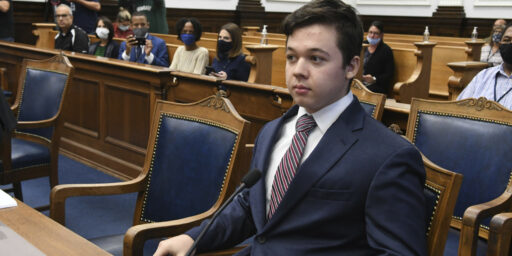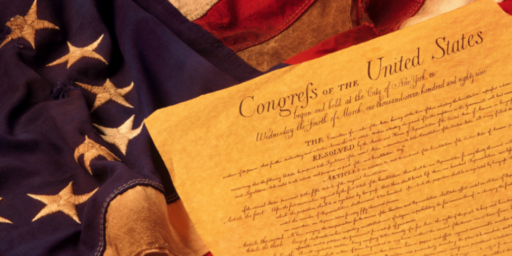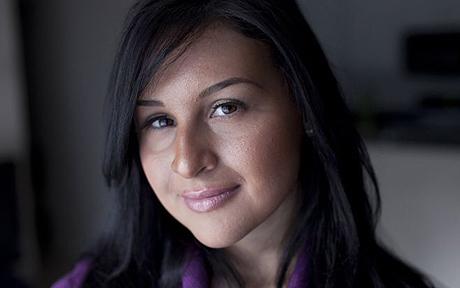Virginity Pledges Don’t Work, Except When They Do
 MSNBC is touting the results of a new government funded survey under the headline: “Study: Teenage ‘virginity pledges’ are ineffective” and the subhead, “Youths who promise abstinence are also less likely to use protection.”
MSNBC is touting the results of a new government funded survey under the headline: “Study: Teenage ‘virginity pledges’ are ineffective” and the subhead, “Youths who promise abstinence are also less likely to use protection.”
The new analysis of data from a large federal survey found that more than half of youths became sexually active before marriage regardless of whether they had taken a “virginity pledge,” but that the percentage who took precautions against pregnancy or sexually transmitted diseases was 10 points lower for pledgers than for non-pledgers.
“Taking a pledge doesn’t seem to make any difference at all in any sexual behavior,” said Janet E. Rosenbaum of the Johns Hopkins Bloomberg School of Public Health, whose report appears in the January issue of the journal Pediatrics. “But it does seem to make a difference in condom use and other forms of birth control that is quite striking.”
This is pretty much what I would have expected. Presumably, a large chunk of teens who sign these virginity pledges do so under peer pressure. And, since people are getting married later and later in life, “waiting until marriage” is a rather unrealistic goal. Further, if you’re planning to have sex, you’re more likely to be prepared.
Looking deeper into the study, though, it gets more complicated than that.
Rosenbaum focused on about 3,400 students who had not had sex or taken a virginity pledge in 1995. She compared 289 students who were 17 years old on average in 1996, when they took a virginity pledge, with 645 who did not take a pledge but were otherwise similar. She based that judgment on about 100 variables, including their attitudes and their parents’ attitudes about sex and their perception of their friends’ attitudes about sex and birth control.
“This study came about because somebody who decides to take a virginity pledge tends to be different from the average American teenager. The pledgers tend to be more religious. They tend to be more conservative. They tend to be less positive about sex. There are some striking differences,” Rosenbaum said. “So comparing pledgers to all non-pledgers doesn’t make a lot of sense.”
By 2001, Rosenbaum found, 82 percent of those who had taken a pledge had retracted their promises, and there was no significant difference in the proportion of students in both groups who had engaged in any type of sexual activity, including giving or receiving oral sex, vaginal intercourse, the age at which they first had sex, or their number of sexual partners. More than half of both groups had engaged in various types of sexual activity, had an average of about three sexual partners and had had sex for the first time by age 21 even if they were unmarried.
So . . . she’s comparing apples to apples, controlling for cultural and attitudinal differences between signers and non-signers. That’s good social science if the thing we’re interested in is whether the act of signing a non-binding, unenforceable contract is meaningful. Rather clearly, the study demonstrates, it isn’t.
The problem, however, is that the study is going to be trumpeted as proving that teens who sign virginity pledges are just as likely to have premarital sex — but are more irresponsible about it when they do! — than those who don’t sign. That’s not the case. It’s just that the teens most likely to engage in premarital sex are less likely to sign the pledges to begin with.
UPDATE: From a report on the study in HealthDay:
“Previous studies found that pledgers were more likely to delay having sex than non-pledgers,” said study author Janet E. Rosenbaum, a post doctoral fellow at the Johns Hopkins Bloomberg School of Public Health. “I used the same data as previous studies but a different statistical method.”
This method allowed Rosenbaum to compare those who had taken a virginity pledge with similar teens who hadn’t taken a pledge but were likely to delay having sex, she said. She added that she didn’t include teens who were unlikely to take a pledge. [emphasis mine]
Again, this is good social science if one is attempting to isolate the effects of signing a pledge. But it shouldn’t be interpreted as a simple comparison of pledgers and non-pledgers. Instead, she’s comparing only the kind of people who would be expected to sign pledges to see if actually signing the pledge changes anything.
Image by Flickr user lostbones under Creative Commons license.






You are reading that wrong, James.
She compared kids with that had similar attitudes, and parents’ similar attitudes, about sex and religion, presumably, among 100 variables, that made the two groups similar.
How do you get this:
“It’s just that the teens most likely to engage in premarital sex are less likely to sign the pledges to begin with.”
The study says that both groups, i.e., signers and non-signers, are equally likely to engage in sex. That there was no significant difference in the two groups with respect to whether they engaged in premarital sex.
This is the most concerning find:
There is an overwhelming body of evidence that abstinence programs are ineffective and a waste of money, and there isn’t a single legitimate study that shows they are. No one should be surprised about that. It is entirely predictable.
James,
I don’t dispute that the pledges are meaningless and that relying on them is bad public policy. But the study is much narrower than that.
The key is this:
She’s comparing only kids who are otherwise similar, not simply those who did and didn’t sign the document.
You are mistaken, James.
She compared the students who took the virginity pledge with another group who were otherwise similar, as noted, but did not take the pledge.
There was no significant difference in sexual activity between those two groups, the ones who took the pledge and the ones who didn’t. Group 1 had taken the virginity pledge. Group 2 had not taken the virginity pledge, but otherwise had similar characteristics.
There was no significant difference in sexual activity between Group 1, the virginity pledge-takers, and Group 2, the group that didn’t take a pledge, except Group 1, the virginity pledge-takers, used condoms and birth control less frequently during sexual activity than Group 2. the ones who didn’t take the pledge.
The key, again, is the “otherwise similar.” She’s conducting a multi-variate analysis, not just comparing two groups directly.
James: “The key, again, is the “otherwise similar.” She’s conducting a multi-variate analysis, not just comparing two groups directly.”
James, because a direct comparison of the two groups, ignoring any covariates, would be wrong. Please don’t judge a study by the headline that some editor puts on it (who probably didn’t even read the article, let alone the study, let alone remember enough stats to pass a Statistics 101 test).
Agreed, from the standpoint of social science and a research question of what impact the pledges have.
I’m not commenting on the study at all but rather on the reporting and interpretation. The study is quite good. The problem is that it’s going to be taken as saying that there’s no difference between those who take the virginity pledge and those who do or even that the pledges are bad because of STD and pregnancy. The study doesn’t say that at all.
Basically, “good kids” are going to be good regardless of a piece of paper and ditto “bad kids.” But the “good kids” are more likely to sign the piece of paper than the “bad kids.”
James, your interpretation here is incorrect:
No. The study doesn’t even look at “teens most likely to engage in premarital sex.” It is looking at teens who signed virginity pledges and compares them to similar kids who didn’t. Those who signed virginity pledges are no less (or more) likely to have premarital sex, but less likely to use condoms or birth control than similar kids who didn’t sign the pledge. A group that is “more or less likely to engage in premarital sex” has nothing whatsoever to do with it.
Your first statement in that paragraph is EXACTLY what the study shows, i.e., “the study is going to be trumpeted as proving that teens who sign virginity pledges are just as likely to have premarital sex — but are more irresponsible about it when they do! — than those who don’t sign.” Though “proving” is a little strong.
I really wish the media would stop reporting on these studies BEFORE the journals are published. The only available issue of Pediatrics that I can find online is December, so there is no way that I know of to find the actual study, where we could look at the methods section.
Additionally, when the media covers these studies, they should really include a link to a .pdf of the study or a direct link to the study in the Journal. I am sure it distresses these researchers who spend hundreds of hours designing studies, collecting samples, analyzing the data, and then drawing inferences from the data to have their work subject to all sorts of inaccurate speculation (and that is not a dig at either James- just saying there is no way to know what is going on without having read the actual study and relying only on the MSNBC write-up.).
By the time we get our hands on the actual study, everyone’s conceptions regarding the outcome will be hardened, doing a disservice to the work the researcher did.
You can only talk to your kids and explain things and the possible outcome if they make the wrong choices….the rest is up to them.
Programs can’t do anymore than having a frank conversation with your child surely, why does everything have to be taken out of the parents hands?
I don’t think it’s the teacher’s job to “parent” kids anymore than I think these programs should be in place of parents input.
It seems to me that anything that involves a child suddenly becomes someone else’s problem and not the parents responsibility anymore….time for more parents to get involved and stop expecting others to find solutions.
John: Agreed on media reporting of journal articles. In this case, though, they are including quotes from the study author and it’s quite likely that the HealthDaily reporter, at least, had a copy of the paper. Now, whether they’re sufficiently trained to understand what they’re reading or being told is another matter.
Well, your headline says “Virginity Pledges Don’t Work, Except When They Do.” Where does it say that in this study? It actually says just the opposite.
“Again, this is good social science if one is attempting to isolate the effects of signing a pledge.”
The study is looking at sexual activity and protection used as an outcome among a cohort of kids over a period of time. During that time Group 1 took a virginity pledge, Group 2 did not take a virginity pledge. That is the independent variable. Sexual activity and practices is the dependent variable. The study was stratified by a variety of cofactors, further described in the study.
“But it shouldn’t be interpreted as a simple comparison of pledgers and non-pledgers. Instead, she’s comparing only the kind of people who would be expected to sign pledges to see if actually signing the pledge changes anything.”
No. She is comparing kids who were likely to delay having sex.
I am pressing this issue because while rend your hands about how reporters might cover this, you yourself are misinterpeting and misreporting the study as well.
So if I understand this right, you’ve got three groups.
Group A, which signed the the Pledge.
Group B, which is, in all relevant aspects, the same as Group A except they didn’t sign the Pledge.
And then there’s everyone else. Let’s just call them the Sex Crazed Teens (SCTs).
Altho the article doesn’t provide any data to compare group A or B to the SCTs, I think it is reasonable to assume that SCTs have a higher incidence of sexual activity than either Group A or B.
The article seems to indicate that Groups A and B had roughly equivalent outcomes regarding sexual behavior. However, money was spent developing and promoting the Pledge.
So unless you’re positing that, absent the the Pledge, Group A would turn into SCTs, somebody just wasted a bunch of money getting kids to sign Pledges. And I’d characterize that effort as ‘ineffective’.
The study is not generalizing the results to SCTs and nowhere does it claim to be doing that. It is not “positing” that absent the pledge or because of the pledge, the kids would be SCTs.
Again, the study says that among two groups who are likely to delay having sex, one having taken a virginity pledge and one who did not, there was no significant differences in the sexual frequency or practices in the two groups. There was a significant difference in condom use and birth control use, the group who took the virginity pledge having lower usage of both.
I thought both writeups were pretty good, but James Joyner has mischaracterized it, starting with his title.
Agreed. My point here is a narrow one: The reporting and commentary out there is based on the misconception that the study compares A’s to non-A’s when, in reality, we’re merely comparing A’s to B’s.
I strongly suspect that the #1 variable here is the attitude/involvement of the parents. A distant second is the date of the onset of puberty, and an innate biological “sexiness” that makes some people more sexual earlier than others.
Of course, children of involved parents, who take them to church, are less likely to have sex early. They are also more likely to sign the pledge. Both of these are the results of the parents’ attitudes and actions.
It never ceases to amaze me how much time sociologists spend (and taxpayers’ money) to prove the obvious. What a racket.
Evidence, please.
Again, the study is saying that all other characteristics being equal teens who took virginity pledges were as likely to have sex as those who didn’t, but were less likely to use condoms and birth control.
This is a public health issue, James, not a political issue. The study demonstrates that these abstinence and virginity-pledge programs are actually harmful, in that the teens who participate are more likely to become pregnant and to be infected with an STD (which is what happens when people have sex with multiple partners without condoms or using birth control.) That’s a little more important than your nonsensical CYA claim that “the study compares A’s to non-A’s when, in reality, we’re merely comparing A’s to B’s.” That is just meaningless gibberish.
Again, I press this issue because it is you who are mischaracterizing the results of the study. Actually the two reports you linked to did a pretty good job, except they didn’t go the step further to observe that they programs are actually harmful, though they hinted at it.
Like any promise… those that mean it are likely to keep it.
So happy to see a methodological discussion on a political blog! Pediatrics did actually post the article this morning; it comes up if you search their website.
The commenters are right that this is not regression. The psychologist interviewed on the Today Show this morning described the method well.
http://today.msnbc.msn.com/id/28415602/
For more info, google “propensity score matching” or “matched sampling”.